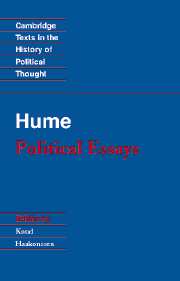Book contents
- Frontmatter
- Contents
- Acknowledgements
- Introduction
- Chronology
- Bibliographical notes
- A note on the text and the edition
- Biographical notes
- Bibliography
- Political Essays
- 1 Of the liberty of the press
- 2 That politics may be reduced to a science
- 3 Of the first principles of government
- 4 Of the origin of government
- 5 Of the independency of Parliament
- 6 Whether the British government inclines more to absolute monarchy, or to a republic
- 7 Of parties in general
- 8 Of the parties of Great Britain
- 9 Of superstition and enthusiasm
- 10 Of civil liberty
- 11 Of the rise and progress of the arts and sciences
- 12 Of national characters
- 13 Of commerce
- 14 Of refinement in the arts
- 15 Of money
- 16 Of interest
- 17 Of the balance of trade
- 18 Of the jealousy of trade
- 19 Of the balance of power
- 20 Of taxes
- 21 Of public credit
- 22 Of some remarkable customs
- 23 Of the original contract
- 24 Of passive obedience
- 25 Of the coalition of parties
- 26 Of the Protestant succession
- 27 Idea of a perfect commonwealth
- Appendix: Excerpts from Hume's History of England
- Notes
- Index
- Title in the Series
15 - Of money
Published online by Cambridge University Press: 05 June 2012
- Frontmatter
- Contents
- Acknowledgements
- Introduction
- Chronology
- Bibliographical notes
- A note on the text and the edition
- Biographical notes
- Bibliography
- Political Essays
- 1 Of the liberty of the press
- 2 That politics may be reduced to a science
- 3 Of the first principles of government
- 4 Of the origin of government
- 5 Of the independency of Parliament
- 6 Whether the British government inclines more to absolute monarchy, or to a republic
- 7 Of parties in general
- 8 Of the parties of Great Britain
- 9 Of superstition and enthusiasm
- 10 Of civil liberty
- 11 Of the rise and progress of the arts and sciences
- 12 Of national characters
- 13 Of commerce
- 14 Of refinement in the arts
- 15 Of money
- 16 Of interest
- 17 Of the balance of trade
- 18 Of the jealousy of trade
- 19 Of the balance of power
- 20 Of taxes
- 21 Of public credit
- 22 Of some remarkable customs
- 23 Of the original contract
- 24 Of passive obedience
- 25 Of the coalition of parties
- 26 Of the Protestant succession
- 27 Idea of a perfect commonwealth
- Appendix: Excerpts from Hume's History of England
- Notes
- Index
- Title in the Series
Summary
Money is not, properly speaking, one of the subjects of commerce; but only the instrument which men have agreed upon to facilitate the exchange of one commodity for another. It is none of the wheels of trade: It is the oil which renders the motion of the wheels more smooth and easy. If we consider any one kingdom by itself, it is evident, that the greater or less plenty of money is of no consequence; since the prices of commodities are always proportioned to the plenty of money, and a crown in Harry VII.'s time served the same purpose as a pound does at present. It is only the public which draws any advantage from the greater plenty of money; and that only in its wars and negociations with foreign states. And this is the reason, why all rich and trading countries, from Carthage to Britain and Holland, have employed mercenary troops, which they hired from their poorer neighbours. Were they to make use of their native subjects, they would find less advantage from their superior riches, and from their great plenty of gold and silver; since the pay of all their servants must rise in proportion to the public opulence. Our small army in Britain of 20,000 men is maintained at as great expence as a French army twice as numerous. The English fleet, during the late war, required as much money to support it as all the Roman legions, which kept the whole world in subjection, during the time of the emperors.
- Type
- Chapter
- Information
- Hume: Political Essays , pp. 115 - 125Publisher: Cambridge University PressPrint publication year: 1994
- 3
- Cited by



